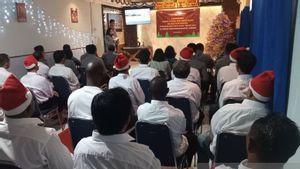JAKARTA - A study predicts the development of the COVID-19 pandemic in the coming years. COVID-19 is impossible to destroy. The coronavirus will become endemic. What is endemic and how does it affect the world? What is our future like?
Last January Nature compiled the testimonials and testimonies of more than a hundred experts in infectious diseases, virology, and immunology. 90 percent of experts who are directly involved in handling the COVID-19 pandemic think that the coronavirus will be endemic. This means that the coronavirus will live in society for many years to come.
"Eradicating this virus (corona) from the world today is like trying to plan the construction of a stepping stone path to the Moon. That's impossible", said Michael Osterholm, an epidemiologist at the University of Minnesota in Minneapolis, United States, quoted Monday, March 1.
Even though it has the potential to be endemic, the impact of COVID-19 is expected to diminish over time. Experts believe the impact of the risk of COVID-19, be it death, infection, or policies - including lockdowns - will diminish over time.
According to the researchers, the future will depend heavily on the immunity of each individual. The type of immunity referred to varies, it can be through an infection process that has infected a person or vaccination.
More naturally, the impact of the coronavirus can decrease due to changes in human life patterns - food intake and lifestyle - which lead to increased immunity. In addition, the impact of a pandemic can also be largely determined by how the coronavirus evolves.
If COVID-19 becomes endemic
COVID-19, if it becomes endemic, will eventually become like influenza. Four other diseases caused by the coronavirus also automatically become endemic. Data showing the presence of a vaccine plus the immunity a person or community has from the infection will help.
In the end, mortality will decrease. Lockdown, maintaining social distancing, or masks will no longer be needed as before because COVID-19 will become a seasonal disease.
On the other hand, more than a third of survey respondents said the coronavirus could be eliminated from several regions. However, in other areas, the virus will persist.

"I think COVID-19 will disappear from some countries, but with the risk of continued (possibly seasonal) reintroduction from places where vaccine coverage and public health measures have not been good enough", said Christopher Dye, University of Oxford epidemiologist, UK.
"Most likely the virus is endemic. But the pattern required is difficult to predict”, said another expert from the branch of virology at Georgetown University, Seattle, Washington, USA, Angela Rasmussen.
Viral behavior
One thing that underlies the belief of experts about the endemic coronavirus is that all types of coronaviruses circulating in the world --OC43, 229E, NL63, and HKU1 - exhibit this behavior. According to them, there are at least three of all types of coronaviruses that may have circulated in human civilization for hundreds of years.
Two of them are even considered responsible for 15 percent of respiratory tract infection problems. Using data sourced from previous research, Jennie Lavine and colleagues developed a model that shows how children who first contract the virus before the age of six are able to develop immunity.
Lavine is an infectious disease specialist from Emory University in Atlanta, Georgia, United States. With the ability of children to develop natural immunity, plus built-in community immunity and ongoing vaccinations, decades into the future, those of us who are experiencing severe shocks from the coronavirus today will see this virus in a different way. No more fear and worry.
Immunologist Daniela Weiskopf of the La Jolla Institute for Immunology in California focuses on the development of human immunity. According to him, the body of every person who has contracted COVID-19 is said to have the ability to form memory B cells, "which can produce antibodies when a new infection occurs. Also T cells can eliminate cells infected with the virus", he said.
The ability of the body's immunity is what really determines how the development of the COVID-19 pandemic going forward. If people - on a large scale - develop lifelong immunity to the coronavirus - be it natural infections or vaccinations - then it is unlikely that the virus will become endemic.
The English, Chinese, Japanese, Arabic, and French versions are automatically generated by the AI. So there may still be inaccuracies in translating, please always see Indonesian as our main language. (system supported by DigitalSiber.id)












